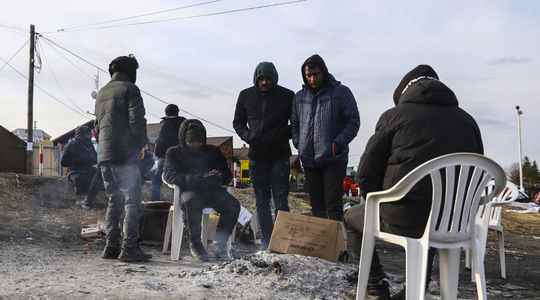Like the Ukrainians, they fled the war to take refuge in France. But unlike them, today they receive their first eviction notice. While the 90,000 Ukrainian refugees in the country are protected by a directive from the European Commission giving them a 6-month right of residence in France, access to housing, schooling or medical care, certain non-Ukrainian nationals, who until then benefited from a temporary residence permit, are indeed ordered to return in their country of origin with which they sometimes have little more ties. A logic of “double standards”, “incomprehensible and unfair” denounced by several member organizations of the French Coordination for the Right of Asylum, including Amnesty International or La Cimade, in a press release published on June 7.
“We don’t have a precise number yet. [probablement plusieurs centaines de personnes, ndlr] concerning these people but for the moment there is a multiplication of cases of refusal of temporary protection sometimes accompanied by an obligation to leave French territory (OQTF), explains to L’Express Mélanie Louis, responsible for deportation issues at Cimade. However, all third-country nationals excluded from temporary protection before having applied for asylum are now in fact in an irregular situation and therefore exposed to expulsion.
Mostly from Africa, students or having studied in Ukraine with an associated right of residence, the people concerned are now trying to enter a university course in France. This is the case of Inza Touré, a 27-year-old Ivorian. From the start of the war, the man who had been studying international relations at Dnipro for three years left central Ukraine to go to Chambéry. Barely a month after receiving a temporary residence permit, the prefect of Savoy issued him, on May 23, an obligation to leave French territory (OQTF) within thirty days. “The prefect says that I haven’t made any effort to show that I want to study,” he told AFP. However, the young man has meanwhile been admitted to a program at Sciences Po Grenoble, where he can resume his studies from the start of the school year. “I’m disappointed. Historically, my country has ties with France, I speak French. So I thought it was going to be easier. But not at all,” he says. In the decree, consulted by AFP, the prefect underlines that “the person concerned does not justify either a private and family life anchored in the long term in France, nor any integration into French society.
France, stricter than Germany or Spain
The French application text of the “temporary protection” promised by the European Union stipulates that only third-country nationals who benefit from “international protection” or who cannot return to their country “in safe and durable conditions” can be taken care of . “France considers that they must return to their country of origin if it is not at war, but this is not what the European Commission says in these operational guidelines published on March 21, emphasizes Mélanie Louis. “It is certain that issuing OQTFs is a rather excessive and surprising reaction, abounds Tania Racho, doctor in European law and researcher associated with the IEDP of Paris-Saclay. And to add: “The basic idea of this European directive is to say: you are granted this temporary protection because your country no longer protects you. It is therefore not inconsistent to wonder how it works in the country of origin. Then there is room for manoeuvre. States have discretionary power over the degree of protection they wish to grant. They can absolutely grant temporary protection without being obliged to check the security in the country of origin”.
According to the French Coordination for the Right of Asylum, Germany or Spain, for example, grant temporary protection to all victims of the war in Ukraine, regardless of the residence permit they held there. In France, people who are refused temporary protection can then apply for asylum or a traditional residence permit. “But these are complex procedures which can take several months and whose fate is uncertain”, regrets Mélanie Louis. And then, we are not overwhelmed by the number, France is quite capable of granting temporary protection to these people.
